- Home
- Jennifer Macaire
A Charm for a Unicorn Page 3
A Charm for a Unicorn Read online
Page 3
Her food tasted like sawdust and her sister's plight made her head ache. She hardly ate a thing, and excused herself before dessert. But when she went to her room, she tapped on Leonie's door. It was closed and locked, and her sister did not answer when she knocked and pleaded with her to let her in.
Finally, the tears she'd managed to hold back all day trickled down her cheeks, and she went to her room, buried her head in her pillow, and cried herself to sleep as silently as possible.
* * * *
Leonie had never been one for tears. Her father detested shows of emotion, and she'd learned at an early age that sobbing never changed his mind. Therefore, she ate her dinner in silence, murmured politely when spoken to, and then excused herself.
Sir Wulfe stood and bowed, taking her hand in his. “My dear, I hope you are as happy as I am,” he said.
Leonie simply smiled. Ann and her father had always insisted she keep her mouth closed and say nothing. Smiling in silence was what she did best. As she left, she heard Sir Wulfe tell her father that she was “exquisite".
Numb described her better. She sat in front of her mirror and unbraided her hair. Slowly, she brushed it. Then she took off her mother's dress and hung it up, and slipped her soft, flannel nightgown over her head. She looked at her narrow bed, its worn white sheets and patchwork quilt, but she didn't lie down. Instead, she took her candleholder and walked down the hallway to her father's study.
The crystal ball winked in the candlelight. Leonie peered into its depths, letting her mind free, not thinking of anything until she felt the little prickle that meant the crystal had become attuned to her. How did she know how to do this? Instinct told her to open her thoughts, to let the crystal enter her mind and link with her. But this time, instead of letting the crystal ball show her what it wished, she turned her thoughts to Renaldo.
Show me Renaldo. Instantly, the image showed a lovely room with a huge stone fireplace and red and blue tapestries hanging from the wall. Renaldo lounged in a comfortable chair, the black and white dog lying at his feet.
Next to Renaldo stood a young man who could only be Renaldo's brother. He had the same slanted, dancing green eyes, though his hair was dark brown and sleek, not tousled red curls. The two young men shared the same fair skin and smattering of freckles, high cheekbones and strong chins. Both wore velvet tunics cut to perfection, tight hose showed their long, muscular thighs, and they wore high leather boots. Both also wore circlets of silver.
"If only Ann could see this,” she murmured to the crystal ball.
She looked carefully at the two young men. They spoke, but she couldn't hear their words. She hadn't learned to adjust the volume on the crystal ball. Renaldo leaned back and crossed his booted legs, and his brother said something that made him laugh. The dog wagged its tail in its sleep, and Renaldo's expression became serious. He stared at the fire a minute, then spoke. His brother perched on the edge of the chair, his face intent. After Renaldo finished talking his brother nodded and grinned, clapping Renaldo on the back.
Had Renaldo told his brother about her? She didn't know, but just seeing him soothed her tortured spirit. How she wished she could transform herself into a bird and fly to him—but magicians didn't do that sort of thing. They could change others, but only the most powerful magicians could change themselves. And powerful magicians hardly existed anymore.
For some reason, magic seemed to be melting away at the same rate that technology advanced. When someone invented a new way of doing something with a machine, then the magic that had been needed before vanished. Her father had explained it with a sailboat. Before the invention of sails, magicians had been required to ride on the boat and use their magic to make the boats advance. But now, with sails, the magicians were free to do other things while the wind worked for them.
There were magicians everywhere, and technology came slowly. But every time technology did arrive, a wizard would lose his job. The fire starters, for example, had been replaced by matches. Not as impressive as a magician waving a wand and starting a blaze with a burst of sparks—but a lot easier to carry around. Some magicians, like her father, did a bit of everything. Others, especially those who lived in great cities, were more specialized, and some worked together, like the wizards in charge of building.
The rules of magic were quixotic, illogical, and unreliable. Ann, with her sharply logical mind, had trouble working with true magic. Leonie, on the other hand, understood it without trying to comprehend it, and that's why the crystal ball and the transformation spells worked on her and not on Ann.
Ann thought that her father had never tried to transform her—but Leonie knew better. She knew it vexed her father considerably he could not make his spells stick on his practical, brilliant daughter, while she, a stupid, empty-headed twit, was as malleable to magic as soft clay.
She had never told Ann this, but while she'd been transformed into a sparrow, she'd spent hours perched in a nook nearby her father. For three days, she'd been privy to his mutterings. He'd muttered about her and he'd muttered about Ann, and she'd learned more about the nature of magic in those three days than in ten years of studying Latin verbs and spells.
The crystal ball went dark, and Leonie stepped backwards, fatigue making her knees tremble. She drew the velvet cover back over the ball, and picked up her candle. Then she went back to her room and locked the door. She fell onto her bed, and sleep claimed her at once, dropping upon her as suddenly and heavily as a black, velvet cover.
* * * *
Renaldo walked his dog before heading upstairs to his rooms. Clara snuffled busily around in the bushes, while Renaldo strolled along the gravel path and thought about Leonie. He'd spoken to his brother, Sylvain, because he had to tell someone about the glorious lass he'd pulled from the stream.
"I swear, at first I thought she was a dryad. Her skin is so fair, her eyes and hair so pale, that she looks to be made of streams and quicksilver ... she's stardust and moonlight.” He laughed self-consciously, and Sylvain had clapped him on the back.
"You're smitten,” he said.
"I want to marry her,” Renaldo told him. “I shall tell our father as soon as he returns from the kingdom of Bromley. When that's done, I'll ask Leonie's father's permission to marry her. I said I'd bring my musicians along. I wonder if Minstrel Giles has some new songs. I'm getting tired of his ‘Through the Green Wood and Back Again.’”
"Maybe he'll get lost in the Green Wood and never come back.” Sylvain yawned. “I think you better talk to Father before you go proposing. You're supposed to marry one of the Bromley princesses, remember?"
"Nothing has been decided, signed or sealed. I'm still free to make my own choice.” Renaldo paused for a second, trying to remember the last treaty the two countries had about marriages and successions, but the image of Leonie took all other thoughts away.
Sylvain went upstairs, and Renaldo whistled for Clara and took her for her walk, his mind full of images of Leonie. Her gentleness captivated him, her pale hair and eyes entranced him, and she moved so gracefully that it seemed she danced all the time. Suddenly waiting for his father to return seemed too long. Why wait? He'd go the next day and storm Castle Veil, taking his bride and carrying her off on his horse, like in the old days, when the tribes took their women by force, by stealth, and by night.
The old ways had given over to the more civilized traditions of wedding feasts and dancing. But there were still, in the far corners of the kingdom, small hamlets where the men would pretend to steal the maiden—though the window be left open on purpose, and the wedding dance performed the next day in the village square.
He could picture himself carrying his bride home on the front of his saddle, her hair flying, her cheeks pink, her eyes brilliant as twin stars.
"Leonie,” he whispered. But only the night birds answered, and Clara pricked up her ears and whined softly.
[Back to Table of Contents]
Chapter Three
Leonie's Letter
The next day, contrary to all his rules, Leonie's father asked her to accompany him to the village. Ann, dressed in a smock and apron to help Cook with the luncheon, stayed behind. Sir Wulfe, powerful wizard that he was, had taken a whirlwind back to his castle. Bob swept up all the leaves in the courtyard that the whirlwind had pulled off the trees. As he swept he muttered darkly. Apparently, he didn't much approve of whirlwind travel.
Leonie put on her cloak and walking shoes, and begged Ann to go to the forest and fetch her clogs, the basket, and the Latin book before it rained and they got ruined. “They're alongside the stream in front of the field of nettles. Thank you, dear.” She'd kissed Ann with lips as cold as ice, and had gone to the village, walking next to Father as if she did it every day of the week.
Ann watched her go, and then she slipped out the back door and went to the woods. She found her sister's clogs, the basket, and the book, and as she picked them up, a loud snuffling startled her. A black and white dog poked its head out of the thicket on the other side of the stream.
Ann gave a shriek and jumped backwards. She lost her footing and landed in a clump of stinging nettles. “You scared me,” she scolded the dog.
"Clara is very sorry.” Ann looked up at the voice, and saw a tall, red-haired young man standing on the far side of the stream. He smiled in a friendly fashion. “She didn't mean to make you fall. Are you all right?"
Ann narrowed her eyes. The young man held a shepherd's crook, but his clothes were far too fine for a shepherd. “Do sheep herders go around wearing such lovely cloaks? Yours is lined in silk, unless I am mistaken. Aren't you afraid to tear it in the brambles?"
The man looked startled, then laughed. “Oh, this old thing. It belonged to my father, I think. I say, have you seen a lamb hereabouts? Someone told me it was last seen around here."
Ann sighed. “My sister, no doubt. So you are the famous Renaldo. Prince Renaldo Hector Alexander something or other,” she corrected. “I hope you don't mind if I don't curtsy. The nettles have given me a terrible rash on the legs."
"I'm sorry to hear that. You should put fresh water on it, and plantain leaves will help, if you can find some.” He raised his eyebrows. “So you're Leonie's sister. Well, so much for my going around incognito. It seems a prince can't go out in disguise these days without a being recognized."
Ann made a face. “Well, if you want to disguise yourself, don't wear nice clothes. I can't imagine the villagers wearing such finery to search for lost lambs. Do you really have so many names?"
"More than I can remember,” he said cheerfully. “Poor lamb. I hope it hasn't been eaten by a wolf. I shall have to look some more.” He hesitated, then said in a low voice, “Is Leonie all right? She seemed worried that her father might punish her for not learning her lessons."
"She's fine."
"Good. I told her I'd be back soon, but I just couldn't wait. I want to see her again. I'm afraid I'm not good at being patient. Is your father here? And is Leonie around? I might as well do this today instead of putting it off until my father gets back. He'll be thrilled anyhow, he and my mother have been bothering me about marriage for months now.” The prince gave her a wide grin.
Ann gnawed on the inside of her cheek. Should she tell him? The image of Leonie's white face came to her then, and she took a deep breath. “They're not here right now. Can you come back here this evening? Right to this place? Leonie has something important to tell you."
He looked taken aback. “To tell me? I hope it's nothing serious. I don't know if she said anything to you, but I can tell you this, I'm hopelessly in love with your sister. I was planning on coming here and bringing my minstrels. I even made them learn some new songs."
"She told me about the minstrels.” Ann's legs burned horribly with nettle rash, but suddenly all that mattered was Leonie's happiness. She liked this prince. He had such a candid face, with clear, green eyes that slanted like a cat's and a wide mouth that stretched easily into a grin. She liked him far better than she liked Sir Wulfe. Something evil and cold lurked inside Sir Wulfe's mind; and whatever it was, it stared out of his eyes and made her shiver.
"Please be here tonight.” Ann pointed to the spot she stood upon. “Leonie will come."
"All right, little sister Ann, for that is your name, is it not? Leonie told me she had a sister, but she didn't say how pretty she was.” Renaldo bowed, and then Clara, his dog, began to bark and he said, “I think she's found the lamb. Farewell, pretty Ann, and thank you. Tell Leonie I'll see her here tonight.” His voice faded as he disappeared into the woods.
Ann picked up the basket, tucked the book in it, and, clogs in hand, went back to Castle Veil. “A nice man, to be sure,” she said to herself in a low voice. “But he must be short-sighted, for I am plain, not pretty."
The path to the village led through a shady wood, then across fields that rolled in gentle hills and dales. Leonie pulled the ribbons on her hat tighter as the breeze picked up. On the top of the hill, the wind flapped in her skirts and tugged at her braid.
"What's the village like?” Leonie asked.
Her father shrugged and replied, “It's a middle sized village."
"And, who rules it?"
The path led downhill now, and the wizard lengthened his stride. “The king rules all the villages in this kingdom."
"Are you the resident wizard for this village?"
He peered at her from beneath bushy eyebrows and said, “Of course, child. What did you think I did?"
"I don't know—stalk around the countryside turning people into frogs.” Leonie had no idea how that popped out, but to her amazement, her father laughed. She nearly tripped over her skirts. Emboldened, she said, “Are you the only magician for this whole kingdom?"
He nodded. “That's right. Windtide has no large cities. Our capital is the smallest one of all the seven kingdoms. So far, I've been able to take care of the whole kingdom. It has meant some travel, and it's true that I sometimes left you girls alone for days. But two magicians would be too many here. Although lately, the population has been growing and I'm sometimes hard put to take care of everything."
"I've never seen any village or city,” said Leonie, giving a little shrug. “So I can't even imagine one."
"You've seen pictures in books, and watched in my crystal when the news appears."
"Yes, but it's not the same. Is there a hospital in Windtide?"
"Of course, child. And there are wizard healers there too. But you know that wizard healers use very little magic now that technology has been invented."
"Yes, I know. Is that good or bad, do you think?"
"Good, I believe. Magic is too capricious. Sometimes it does the unexpected, whereas with technology you always know what will happen. For example, when I put a plaster cast on a broken leg, I know it will stay on until I take it off. Sometimes a spell would wear off unexpectedly, and some people are immune to magic, and in the old days, couldn't be treated at all."
"A bit like Ann. Thank goodness we have some technology now. When she had the whistle cough, you could heal her with chemistry. That's a bit like technology, isn't it? Tell me, are some magicians more important politically than others?"
Her father looked at her, a startled expression on his face. “I see you are starting to take an intelligent interest in things around you. And to forestall your next question, Sir Wulfe is the resident wizard for the kingdom of Querel, and he is far more powerful than I. He is immensely rich and influential. He did us a great honor asking for your hand in marriage."
"What is the kingdom like?” Leonie shivered at the mention of Sir Wulfe.
Her father frowned, then said, “Alas, the kingdom of Querel is torn by a civil war. If I doubted for an instant that Sir Wulfe could protect you, I would never have agreed to his proposition,” he hastened to add.
Leonie looked at him askance. “A civil war?” She had lived all her life in the peaceful kingdom of Windtide, so she couldn't begin to imagine the strife of war.<
br />
"The Crow Caller came to tell the latest news. Supposedly the fighting has intensified."
"Is it dangerous to go to Querel?"
"No, most of the fighting takes place at sea. Querel is a long, narrow kingdom bordering the Westyrn Ocean, and it includes many islands and a long coastline. Both princes covet the islands, for they are rich in minerals. Three years ago, the two princes of Querel claimed the throne and ousted their father, King Gustavo. The princes’ father has been pushed into the far corner of his kingdom, near Sir Wulfe's land. Sir Wulfe has been trying in vain to stop the war and reconcile the two princes, Alonzo and Hidalgo, but so far they refuse even to parley."
"How dreadful!” Leonie plucked a cornflower from the side of the road and gently smoothed its blue petals. “You've told me more about Querel than I know about our own kingdom. Oh, I know we live in a small kingdom caught between Querel and Bromley, and that our chief export is wool. I also know that we have no major cities."
"What else do you want to know?"
"Who rules Windtide? Is he powerful? What's our king's name?” Leonie asked.
At once she realized she'd made a mistake. Her father's face grew as dark as a thundercloud. “King Miles,” he spat, then clamped his lips in a thin, tight line.
Leonie's heart sank. Any hopes she had for convincing her father that a prince would be better than a wizard had been dashed by her father's words and tone of voice. They finished the rest of the walk in silence, so luckily the village came into view around the very next bend.
The village! Leonie knew this was a very small village, but she had never seen such a hustle and bustle. Horses pulling carts and carriages, mules laden with bundles, even a team of oxen, made their way down the main street. Women and men strolled about, and some children played in the shade of a huge chestnut tree planted in the middle of the village square.
"Is it always so busy?” Leonie asked, holding back a bit.

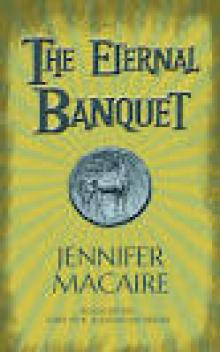 The Eternal Banquet
The Eternal Banquet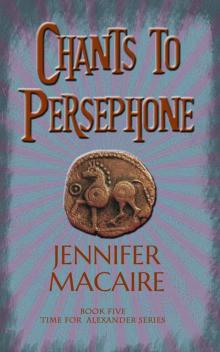 Chants to Persephone: The Future of the World Hangs on a Knife's Edge - and Only a Human Sacrifice Can Save It
Chants to Persephone: The Future of the World Hangs on a Knife's Edge - and Only a Human Sacrifice Can Save It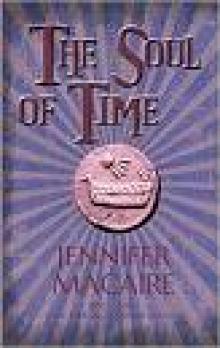 The Soul of Time
The Soul of Time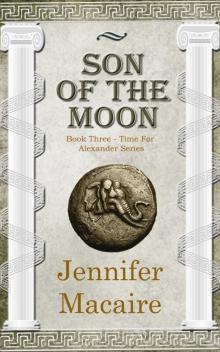 Son of the Moon
Son of the Moon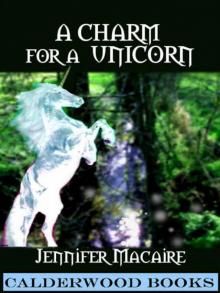 A Charm for a Unicorn
A Charm for a Unicorn The Road to Alexander
The Road to Alexander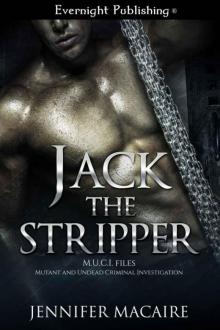 Jack the Stripper
Jack the Stripper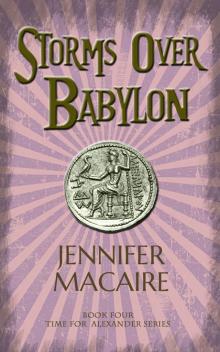 Storms over Babylon
Storms over Babylon Virtual Murder
Virtual Murder